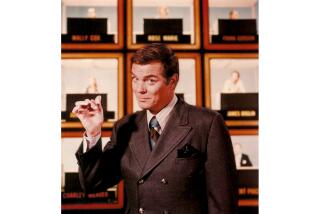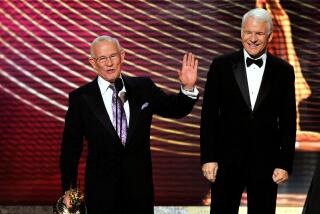Now On Video ... Mr. Television!
- Share via
FROM NEW YORK — When you sit down for a chat with Milton Berle, he asks you where you’re from.
You mention your birthplace. His eyes light up, along with that toothy, almost feral grin. “I played there in 1928,” Uncle Miltie tells you. “I bombed. It was horrible.”
He even remembers who shared the bill with him at the old Loew’s Poli. Then the grin softens into a nostalgic smile. “Ah, but the girls!” Uncle Miltie sighs, savoring a happy memory.
It’s hard to believe, but “Mr. Television” is 85 years old.
He doesn’t really look it. To be sure, he moves carefully, as old men do. And he chooses his words with care. And when he speaks of people from days gone by, sometimes you can feel their ghosts in the room.
But Uncle Miltie get old? No way!
For those of you who just tuned in, Berle was a vaudevillian who already had made the transition to a moderately successful radio career when the new medium of TV arrived.
On June 8, 1948, at age 39, he launched “Texaco Star Theater,” a one-hour comedy-variety Tuesday nights on NBC. Television’s first monster hit made him a superstar and, incidentally, helped sell about a zillion TV sets.
Today, at an age when many men are napping after lunchtime and easing into their 20th year of retirement, Uncle Miltie is making yet another showbiz venture: Selling videos of his old TV show on cable’s QVC shopping channel.
Back in June, when the three videocassettes and one audiocassette first went on sale, Berle went on QVC to promote them.
“Within 18 to 22 minutes, I’d say they sold $200,000 worth,” he says. “We had 505 people waiting on the telephone lines to buy them and we finally had to put up a sign: Sold out.”
His distributor is Direct to Retail (the same folks who bring you the Ginsu 2000 knife set and the Topsy Tail hairstyling tool), but Berle still owns the tapes, reconstructed from old Kinescope footage of the show.
The comedy still works and some of the guest acts are priceless: Martin and Lewis. Elvis. Cole Porter. Dozens of others. And burlesque comedy that hasn’t been seen on TV in decades.
“Things are new if you’ve never seen them, so this is new for a whole new generation,” Berle says.
“I think the comedics and the comedy stands up,” he says. “If you go to see a Laurel and Hardy picture or a Three Stooges, funny is funny, if it’s black and white, yellow, green or in color.”
Making television shows back then was a different business, he says.
“We did them live. There were no cue cards. No TelePrompTers. No phony laugh tracks. No stop and go with tape,” he says. “And you were doing monologues and you were doing jokes, one-liners. And if a joke bombed, baby, it BOMBED. There was silence and you stood there with egg on your face. You always had to be ready with a protective line like ... ‘May I see your library cards?’ ”
Berle acknowledges that his videos are a part of his legacy to the television generation. He reflected on it for a moment.
“This is a very tough business,” he says. “One of the greatest entertainers in the world, outside of Al Jolson, was Sammy Davis Jr. Now tell me, honestly, have you recently heard Sammy Davis’ name?”
No.
“That’s the name of the game. Once you’re gone, what’s coming next?”
“There are monumental stars. They are alone by themselves in their style and their personality. Presley, God love him, was loved by everybody, served his country, died young, and they’re still mourning over him.
“Presidents, leaders like Martin Luther King, yes. That’s political. But actors, entertainers? They’re forgotten.”
Uncle Miltie shrugged slightly, a careful little shrug, and suddenly he was 85 years old.
“Someday they’ll say, ‘Milton Bur-ley? Who was he?’ Maybe this will show them.”
More to Read
The complete guide to home viewing
Get Screen Gab for everything about the TV shows and streaming movies everyone’s talking about.
You may occasionally receive promotional content from the Los Angeles Times.






